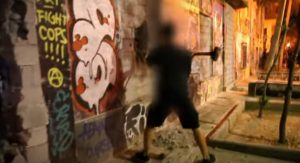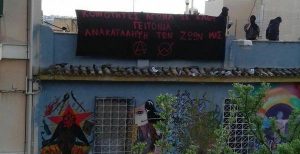 On friday 26 june, in Exarchia, the Greek state evicted and sealed Dervenion 56 and the building at Dervenion 52. An immediate gathering of solidarity was held on Exarcheia square for several hours. In the evening of the same day, a solidarity march was held with the participation of 300 people. The march ended at the Dervenion squat, barricades were set up around the perimeter and then comrades broke the concrete blocks of shame. Police never came and after some hours the protesters left. Riot cops made again an operation the next morning, building again a concrete wall in front of the squat’s door. According to information, in the following days, various solidarity actions followed, a demonstration took place on the main shopping street of Athens, Ermou, where slogans were shouted, and apparently some people attacked multinational clothing companies in Ermou in the occupied -by the police-, center of Athens. Even the rich yuppie nephew of the Prime Minister, the mayor of Athens, Costas Bakogiannis, could not escape the anger caused by the evictions. The pioneer of violent gentrification and his bodyguards were attacked with coffees and other items by dozens of people at a local religious festival. In the following days a march was held again at Exarcheia where comrades demolished the walls of the sealed migrants’ squats at Themistokleous 58 and Spirou Trikoupi 15. All these days, texts of solidarity were written and banners were put in various locations in Greece. [Read More]
On friday 26 june, in Exarchia, the Greek state evicted and sealed Dervenion 56 and the building at Dervenion 52. An immediate gathering of solidarity was held on Exarcheia square for several hours. In the evening of the same day, a solidarity march was held with the participation of 300 people. The march ended at the Dervenion squat, barricades were set up around the perimeter and then comrades broke the concrete blocks of shame. Police never came and after some hours the protesters left. Riot cops made again an operation the next morning, building again a concrete wall in front of the squat’s door. According to information, in the following days, various solidarity actions followed, a demonstration took place on the main shopping street of Athens, Ermou, where slogans were shouted, and apparently some people attacked multinational clothing companies in Ermou in the occupied -by the police-, center of Athens. Even the rich yuppie nephew of the Prime Minister, the mayor of Athens, Costas Bakogiannis, could not escape the anger caused by the evictions. The pioneer of violent gentrification and his bodyguards were attacked with coffees and other items by dozens of people at a local religious festival. In the following days a march was held again at Exarcheia where comrades demolished the walls of the sealed migrants’ squats at Themistokleous 58 and Spirou Trikoupi 15. All these days, texts of solidarity were written and banners were put in various locations in Greece. [Read More]
Athens: Solidarity action for Dervenion 56. An international call for solidarity
Athens: Koukaki fell heavy on them
 Since 2017, the Koukaki Squat Community (Matrozou 45, Panaitoliou 21, Arvali 3) set up a different competitive example of communal life in the center of Athens. Through horizontal procedures, collective work and persistence, it set up open and social projects of communal housing, public bath and laundry, clothes sharing, spaces for public events and a multilingual library. Operating in an area which has been transforming from residential neighborhood to first-class tourist resort, the Koukaki Squat Community raised an embankment against the repressive and economic policies of the state and the bosses, against fascism, racism, and patriarchy. A living hearth of resistance, it also actively supported and connected with other struggles, political projects and public assemblies [1].
Since 2017, the Koukaki Squat Community (Matrozou 45, Panaitoliou 21, Arvali 3) set up a different competitive example of communal life in the center of Athens. Through horizontal procedures, collective work and persistence, it set up open and social projects of communal housing, public bath and laundry, clothes sharing, spaces for public events and a multilingual library. Operating in an area which has been transforming from residential neighborhood to first-class tourist resort, the Koukaki Squat Community raised an embankment against the repressive and economic policies of the state and the bosses, against fascism, racism, and patriarchy. A living hearth of resistance, it also actively supported and connected with other struggles, political projects and public assemblies [1].
Such an active community of equality and solidarity could not go unnoticed. As many other squats and political projects in Athens, the squats in Koukaki were targeted multiple times by the state, both by syriza and nea dimokratia governments, as well as through fascist attacks [2]. Facing evictions and repression, the comrades resisted and defended their community by retaking the houses and through dynamic interventions. [Read More]
